- Home
- Tim Powers
Three Days to Never: A Novel Page 39
Three Days to Never: A Novel Read online
Page 39
Charlotte’s straight back was still moving away, and the man carrying Daphne was still advancing toward her—Marrity could see that Daphne was struggling weakly in his arms—and now Charlotte called out, “We’ll meet in the middle. You put her down there, and take me.”
Marrity started forward, and was yanked back by the two men holding his arms.
“I’m getting my daughter,” he told them, “since she can’t walk. Come along if you want, but I’m going to her.”
“You stay here,” said the young man on his right, sounding nervous. “Somebody will fetch her.”
Marrity just leaned forward with all his weight, and his captors took an involuntary step forward to catch their balance.
“I’m the one who’ll fetch her,” Marrity said.
“Let him go,” said the man on Marrity’s left, “they can all see him. We’re supposed to be watching the van, anyway.”
“Okay.” The other man began patting Marrity’s shirt and pants, but his companion said, “They’ll have frisked him. Come on.”
As they stepped away behind him, Marrity began cautiously walking toward where Charlotte and the man carrying Daphne were about to meet, and he hoped the bulge on his ankle wasn’t conspicuous. His hands were raised.
Charlotte stopped when she was facing the white-haired man, and Marrity heard him say, “Good to see you again, sweetie!” as he crouched and carefully set Daphne down in a sitting position on the dew-dark asphalt; and Daphne braced herself with her hands to stay upright, and looked around, blinking.
“I’ve got her, Charlotte,” Marrity called, stepping forward more briskly, his hands still up. He hoped to get Charlotte as well as Daphne out of this, though he had no idea how to accomplish it.
Charlotte looked back over her shoulder in evident alarm. “Frank!” she said. “How the—oh God—be very careful.” The man who had been carrying Daphne took Charlotte’s arm and led her off to the north, to Marrity’s left.
“Daddy?” said Daphne, raising her knees as if to get to her feet.
Marrity was just shuffling toward her around one of the olive trees on the strip of grass when, ten yards behind Daphne and to the right of her, a figure stepped forward out of the shadow of the trellis. Marrity recognized the twisted face—it was the old man he had thought was his father, and who turned out to be his own shameful self. Then Marrity saw that the old man was raising a gun, and that it was pointed at Daphne.
Marrity’s left hand was snatching up his cuff even as he yanked his knee up, and his right hand pulled the gun from his sock as the old man’s first shot exploded a patch of asphalt a foot away from Daphne’s hand and rang away to Marrity’s left in ricochet.
And then Marrity had put the front sight of his little automatic on the old man’s torso and he was pulling the trigger over and over again as the gun thudded against his abraded palm and the spent shells spun away to the side, and he was killing his own cowardice as much as he was protecting Daphne, and at last in the ringing silence he was just standing there in the chilly breeze tugging at the unyielding trigger. The slide was locked back, the gun emptied.
Abruptly a hard impact to his left shoulder spun Marrity around, and in the moment before four more rapid-fire shots punched into his chest and abdomen and flung him back against the olive tree, he saw the white-haired man who had carried Daphne squinting at him over the barrel of a revolver. Another rending shot to the abdomen doubled Marrity over and he pitched to the grass, rolling onto his back and then lying still.
Canino had violently pushed Charlotte ahead when he turned to face Marrity, and with no eyes looking at her, she stumbled and went to her knees on the asphalt as, through Canino’s eyes, she watched Frank Marrity hammered to the ground beyond the jumping barrel of the .45 revolver.
Even before Canino had fired all six shots, she had reached around to the back of her waistband and snatched out her .38 and cocked it. And she was aiming it toward where Canino stood, so that when he turned his gaze toward her she only had to move the revolver slightly to see right down the barrel of it, and then she pulled the trigger.
Canino’s halved viewpoint showed a fast spin of sky and parked cars and then was gone.
The parking lot echoed now with screams and running footsteps, and the only steady viewpoint Charlotte could fix on showed Daphne sobbing and still trying to get to her feet out in the middle of the pavement. Charlotte could see herself crouched beyond the girl, and so she stood up and sprinted forward.
“The two Frank Marritys are dead,” came Rascasse’s oddly high-pitched shout from up high—he must be in the tower, Charlotte thought as she ran. “Get hold of Daphne,” the shrill voice went on loudly, “hold her, don’t let her get hurt!”
Charlotte grabbed Daphne under the arms and yanked her upright, and she was sure now that the helpful gaze that was letting her see what she was doing was Mishal’s—he had moved off to the south side of the parking lot, and nobody else had gone that way.
By Mishal’s field of vision, she began dragging Daphne back toward the two Mossad vans, and she tried to hold Daphne to the other side as they neared the strip of grass where Frank Marrity’s blood-splashed body lay—but now Mishal was seeing her and Daphne over the lined-up back and front sights of a pistol.
The stubby front sight edged down and to the right and centered on Daphne’s chest.
Charlotte spun to block it, and the gun barrel wavered, and then Daphne’s brown-haired head was visible by Charlotte’s waist, and the barrel dove that way. Charlotte grabbed Daphne in a bear hug, turning so that Mishal could see only Charlotte’s back. You’ll have to shoot her right through me, Charlotte thought dizzily.
And he evidently decided to; the front and back sights lined up again, centered this time on the small of Charlotte’s back, when several more shots concussed the dawn air—and Charlotte was still standing, unhurt—and through Mishal’s eyes she saw the gun barrel disappear, replaced by a rapidly expanding view of damp pavement.
Twenty-eight
Frank Marrity’s vision had narrowed as if he were looking down a tunnel at the distant morning world. He was aware of his right hand, and he made its fingers pry up the blood-soaked edge of his pants pocket and slide in.
His whole torso was a glass wrapped in a napkin and then stomped—the pieces were still loosely held together, but broken beyond hope of repair. Blood bubbled from his lips and he couldn’t move anything in his shattered chest to get air in or out. Dimly he realized that he was drowning in his own blood, and he could feel arterial blood surging out through the rips in his belly.
His hand came back out of his pocket, clutching the crumpled Einstein envelope and the chip from the Chaplin slab. He managed to raise his forearm straight up, and then topple it the other way, toward his face; and he licked the Einstein envelope and clutched the chip of cement in his wet fist, and he stared up at bright spatters of his blood on the trunk of the olive tree.
I’m all the way up there, he thought dimly, four or five feet off the ground, and I’m way down here too.
The fact of dying made it easy for him to step out of his body.
And though the physical contacts with Einstein and Chaplin didn’t summon those ghosts again, the contacts did tug Marrity’s disembodied self in the direction of those specific moments in the past, and amplified the effects of the bloodstains in freeing it from strictly sequential time.
He could see the parking lot at some distance, as if below, though there was no up and down in this non-space. His body was the end-point in a line that trailed out of one of the vans. In their entries and exits the cars and vans made a static tangle of intersecting metal tubes in the lot, looking more like an air-conditioning system on the roof of a big building than anything else, but it was all receding as his focus expanded.
Arcs like jet contrails spanned the blank nothingness out here, and he knew they were lifelines. He could see his own, which ended in an exploded-looking rope-end very nearby, and he could see
two others, at the distance of a few seconds in the direction of the past, which also ended in ragged bursts. Something native to this non-space was clinging—had always clung—to those ragged lifeline ends, and Marrity’s attention was overlapping the thing. It was in some sense alive, and Marrity hoped that his own extended viewpoint was not a result of his sharing in the alien thing’s consumption of the two recently ended lives.
Parallel with his viewpoint he could perceive Daphne’s lifeline, and he found that his attention extended to it. And her attention extended to his—closer to her lifeline he could feel her awareness of him. In a point that had no location in space or time, they clung wordlessly to each other.
What Einstein had done with the lifeline of the suicide in the tower in 1932, Marrity was trying to do in reverse with Daphne. Einstein had pried the woman’s lifeline up out of the four-dimensional fabric, and Marrity was now blocking Daphne’s lifeline from moving in that extradimensional direction. In this timeless view he had always been here blocking it.
Their linked attentions amplified each other, occupied a wider focus—and Marrity was aware of a vast wall, or shear, or towering gap in the direction that was future. It was not just the ends of lifelines—it seemed to eclipse all lifelines, and whatever it was, it was no more than the distance of two minutes away.
Marrity hoped their attentions would widen in a perpendicular direction to get them “over the top” of it—and he tried to convey Climb, climb! to Daphne, and he projected the image of an airplane taking off on a short runway, desperately clawing the air to get altitude before it reached the boundary of trees.
Together, boosting each other, their attentions soared until even the woven lifelines were far away, and the world itself was just a far-ranging helix around the curving pillar of the sun, and then in spite of their tininess they even glimpsed the vast dazzling crown or blazing flower of galaxies moving apart through space that uncurled around them—
Their attentions fled, recoiled, narrowed sharply toward their little world again, like a rocket that comes back down only after the world has turned all the way around under it.
In the sunlit tower, the woman who was Rascasse projected her attention to the oiled glass that lay on the backseat of one of the cars in the lot below, and somehow for a moment it seemed to be a dinner jacket draped over a chair by a swimming pool at twilight. But she concentrated, and when she could feel the slick glass under her fingers as well as the tower’s gritty cornice railing, and smell the car’s upholstery as clearly as she smelled the morning breeze, she stepped back, out of her body, into the volume of space Einstein had been occupying in 1932.
And in the wall that was the tower extending in both directions through time, she could see the persistent ripple where Einstein had gathered up the vacuum energy, for God knew what purpose.
The hungry denizens of this state were present very close by, attached to the several newly chopped-off lifelines—this time Rascasse didn’t need to kill anybody to pay her way onto the freeway. She let her attention overlap theirs.
On this bigger scale, she perceived the lifelines that stood out like comets in this non-sky, and Daphne’s was there.
Rascasse’s attention extended in the direction of Daphne’s lifeline, but somehow Frank Marrity blocked her way, even though Marrity was dead. Both versions of Marrity were dead! Her father had somehow blocked Daphne’s lifeline with his identity, so that focusing on her simply deflected Rascasse into the past direction, to where Marrity’s lifeline hung truncated.
Rascasse became aware of something like a cliff, or static waterfall, in the future direction, and all perceptible lifelines disappeared from view where they met it. It was only seconds distant, and in panic she fell back into her four-dimensional body.
She was draped like a towel over the railing, and had to thrash and flail her limbs to get upright again.
Mishal’s down,” yelled Malk. He reached his right arm across and fired two shots out the open van window and then opened the door and leaped out. Lepidopt heard him yell, “Blow it up!” as he scrambled away.
From the back of the van, Lepidopt peered through the windshield and gritted his teeth. Charlotte was rapidly dragging the Daphne girl in this direction, though it was a wonder nobody had shot her yet, and beyond her he could see two sprawled bodies, Marrity’s on the grass straight ahead and Mishal’s on the pavement off to the right.
Do it, he told himself.
Lepidopt tore open his shirt and yanked off the tape that held his dried finger against his skin, and he threw the tape with the finger still clinging to it into the far corner.
We did win the Yom Kippur War, he thought, even without help from the future.
He turned to the ashtray and quickly picked up Marrity’s recently crushed-out Dunhill filter, and he gripped it between the first two fingers of his left hand as he positioned his bare feet on the gold swastika, pressed his hands into the sweaty Chaplin handprints, and projected his consciousness out to the beacons on Mount Wilson and in Death Valley.
And he hesitated, suddenly quailing at the thought of the abyss he was facing.
To Marrity he said, “Who played Rooster Coburn?”—and he gritted his teeth and pushed off.
If Marrity replied, Lepidopt could no longer hear him. Two different breezes were whistling in his ears, and he smelled pine and weathered wood, and he felt a faint electric tingle in the soles of his bare feet—
For a moment it was the remembered out-of-body weightlessness, and he choked with vertigo—but then he was spinning down through darkness, and the cigarette filter between his fingers was vibrating as if he were dragging it fast along a finely corrugated wall, and he let himself step gratefully back into his body as a gust of energy whipped past him and rushed away downward.
He was still in the van, and in the first instant, he thought the bomb had gone off—a man holding a set of keys was knocked off his feet and the sand in the cat box in the corner was blown up against the van wall. The lightbulb overhead was swinging back and forth.
“What the hell was that?” snapped Malk from the driver’s seat, his voice sounding strained to the breaking point. “The blasting cap?”
Lepidopt noted that Malk was still in the front seat. He had not yet got out of the van.
The man with the keys sat up on the van floor and blinked up at Lepidopt. Lepidopt stared down at him and dizzily recognized his own two-minutes-younger self.
A single infant wailed on the floor by the back doors, and both of them jumped and stared at it. As he instinctively started toward it, Lepidopt noted wispy dark hair, and little fists and feet waving—
I can’t get it out of the field in time, he thought, and even as he reached for the baby—the infant duplicate of himself—it winked out of existence.
At some point Malk had turned around in the driver’s seat, and now his eyes were wide at the sight of the two identical Oren Lepidopts.
In the still quiet dawn air Lepidopt heard Charlotte Sinclair, outside, say, “Frank! How the—oh God—be very careful.”
While Malk and Lepidopt’s own younger self gaped at him, Lepidopt twisted the dial on the kitchen timer beside the bomb. “One minute,” he said. “We’ve got to get out of here.”
The other Lepidopt scrambled up from the floor. “Because of Louis?” he asked.
“Because of everybody,” Lepidopt told him.
Malk was trying to say something, but Lepidopt cut him off with a wave as he slid between the front seats and grabbed the passenger-side door handle. “Later. Fifty-six seconds.”
At that moment the morning stillness was shaken by rapid-fire shooting, and the two Vespers men who had been watching the van whirled to look back toward the tower.
Frank Marrity was standing beside an olive tree and emptying his pistol into his older self.
Lepidopt flung himself out of the passenger-side door and, braced against the flanking car, aimed his .22 automatic across the parking lot at the head of the wh
ite-haired man who had stepped away to the left with Charlotte, and as the man shoved Charlotte away and drew his big revolver, Lepidopt shot him through the head.
The two Vespers men only a few yards away spun at the sound of the shot, and one of them managed to fire twice before they were punched backward by several fast shots from the driver’s side of the van; one sat down hard and then tipped over, but the other fired once more before Lepidopt put a final bullet into his forehead.
Lepidopt was suddenly dizzy, and he thought he knew why. Here it ends, he thought. Baruch Dayan Emet, Blessed is the Righteous Judge.
Civilians were screaming and running, and Lepidopt hoped they were running away from this area, not into it. He shook his head to clear it and shifted his bare feet on the asphalt, making himself scan the scene over the barrel of his gun.
Marrity was crouched over Daphne out in the middle of the pavement, and Charlotte was hurrying toward them from the left; Mishal was running up to them too, from the right, and he was pointing a gun at them.
He can’t let the Vespers have Daphne and her father both, Lepidopt realized. He’s got to kill Daphne. Lepidopt remembered the Queen albums in the little girl’s bedroom.
“Get hold of Daphne!” yelled an old woman from up in the tower belfry. “Don’t let her get hurt!”
Mishal fired once, but he was running and the bullet struck beside Daphne’s knee.
Charlotte paused, raised a revolver and yelled, “Mishal!” and when the old katsa glanced at her, she shot him in the face.
Lepidopt found that he was looking at Charlotte over the sights of his own gun, and even as his finger found the trigger, she had turned and pointed her own gun unerringly straight at him.

 Expiration Date
Expiration Date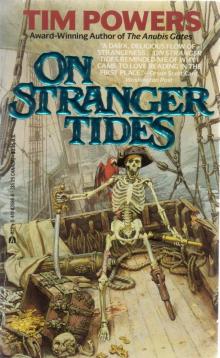 On Stranger Tides
On Stranger Tides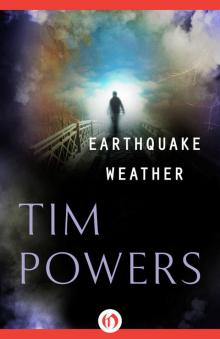 Earthquake Weather
Earthquake Weather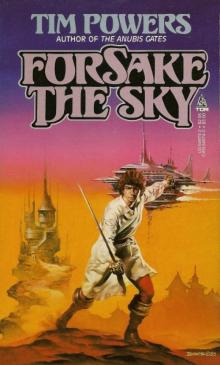 Forsake the Sky
Forsake the Sky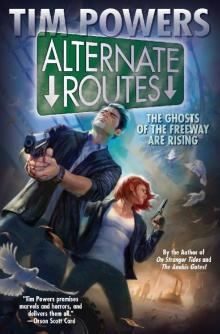 Alternate Routes
Alternate Routes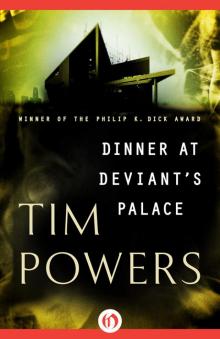 Dinner at Deviant's Palace
Dinner at Deviant's Palace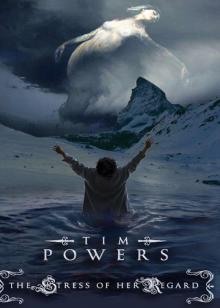 The Stress of Her Regard
The Stress of Her Regard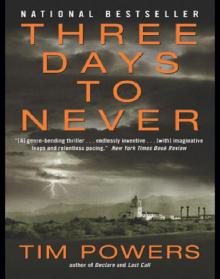 Three Days to Never: A Novel
Three Days to Never: A Novel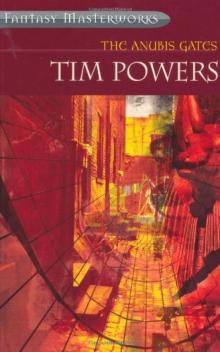 The Anubis Gates
The Anubis Gates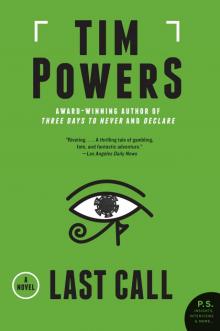 Last Call
Last Call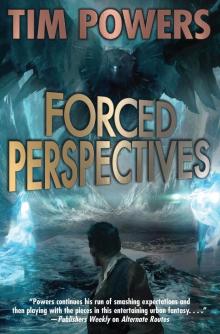 Forced Perspectives
Forced Perspectives Strange Itineraries
Strange Itineraries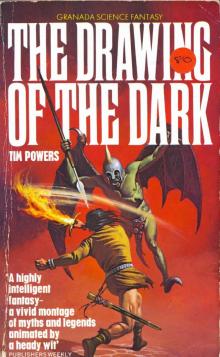 The Drawing of the Dark
The Drawing of the Dark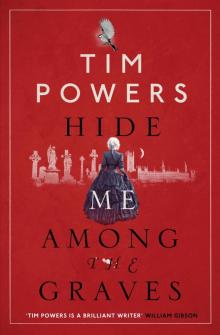 Hide Me Among the Graves
Hide Me Among the Graves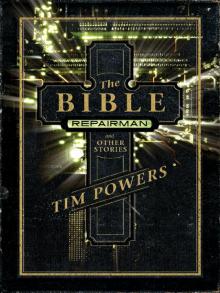 The Bible Repairman and Other Stories
The Bible Repairman and Other Stories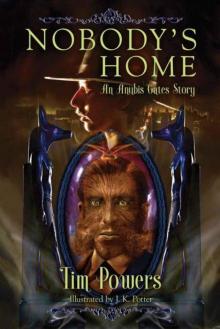 Nobody's Home: An Anubis Gates Story
Nobody's Home: An Anubis Gates Story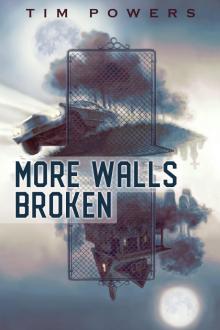 More Walls Broken
More Walls Broken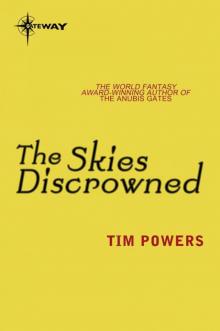 The Skies Discrowned
The Skies Discrowned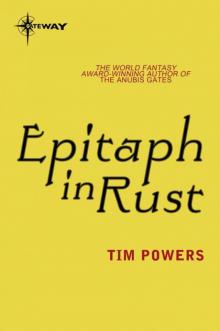 Epitaph in Rust
Epitaph in Rust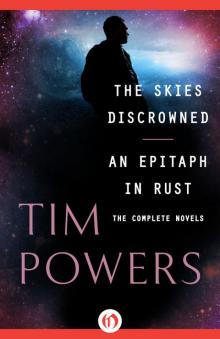 Skies Discrowned and An Epitaph in Rust
Skies Discrowned and An Epitaph in Rust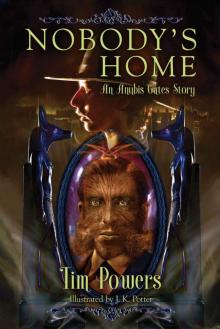 Nobody's Home
Nobody's Home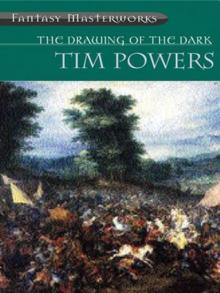 Drawing of the Dark
Drawing of the Dark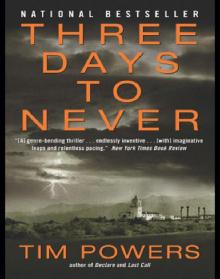 Three Days to Never
Three Days to Never